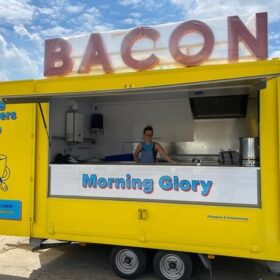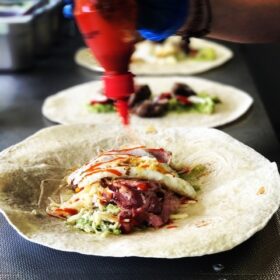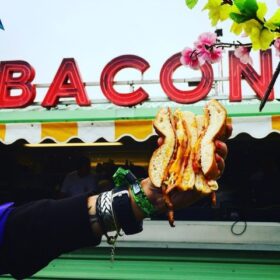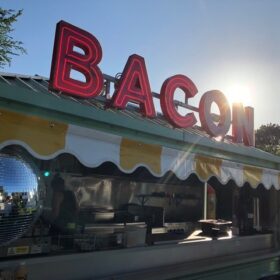When you envisage a summer of fun it no doubt involves picnics in the sunshine, BBQs aplenty and maybe even a trip to the seaside. For Jen and James of Morning Glory it means back-to-back festivals, breakfast all-day-every-day and smiling faces covered in glitter; and they wouldn’t have it any other way!
Morning Glory is the breakfast-focused brainchild of Jen and her partner James where they serve breakfast from 7am to 7pm at various festivals across the summer. When Jen decided to start her own business, it felt like a natural progression in her career after years of experience in a similar field. ‘It’s what I’ve always done. I made a lot of mistakes that I’m sure had I made on my own would have been harrowing, but now they have stuck in my mind’ admits Jen. These mistakes may have been plentiful, but so too were the learning opportunities that gave Jen the confidence to take over the then aptly named Little Green Trailer, even if, as she confesses, it was a poor choice of name. ‘We were in the process of taking over the business and there was a moment of ‘what are we going to call ourselves?’ and a friend of mine suggested giving it a holding name like Little Green Trailer or something and we did. It was a pretty terrible name; it didn’t really describe anything we sell!’ The name may have only been a holding place, but the now renamed Morning Glory, is here to stay and with a festival focused season, Jen and James have built a business that gives them everything they need; a healthy work-life balance, the chance to work together and the opportunity to meet new, exciting people every summer.
But why only festivals? We couldn’t be so bold as to suggest that festivals are like Marmite, in that one either loves them or hates them, but they can certainly be positioned in a similarly opinion dividing category. For many traders, festival season is a welcome shake up from the cold cobbled streets of weekend markets, whilst others, steer clear of any but the big G. It’s then tantalisingly interesting to find a trader who only trades at festivals. ‘Something that I’ve learnt through just doing festivals is that you actually get so much more. Not necessarily in terms of the money you can make, but you get so much more out of your time. Not only that, but it’s the fact that you get to meet so many people so quickly. It’s like a lived experience.’ This freedom afforded by a career in mobile catering is no surprise to Jen and for her it is a noteworthy appeal of the industry. ‘In Street Food it’s that idea that your time is your own and you’re your own boss.’ With that in mind the freedom of mobile catering, coupled with the bountiful business of festivals sound like perfect pairing and it’s no wonder that they prove to be such an exciting time for Jen and the team. ‘I love the life that I have inside the festival season just as much as outside, I’m sat here waiting for that time to come back round!’ The seasonality of Morning Glory allows Jen and James to enjoy their own parameters of success, which means the opportunity to meet new smiling faces, coupled with the chance to have restful months with family and friends. ‘Success doesn’t have to be financial. You can look forward to having a really great lifestyle and your business supports that lifestyle.’
By finding a model that works for them, Jen and James have given their business the space to grow organically, whilst still guiding it in the direction that they want to go. ‘Less is more. A friend of mine Ed, who runs The Duck Truck, once said to me ‘don’t be a busy fool’ and that phrase sticks with me often.’ So how does one go about not being a busy fool? ‘Knowing exactly what it is that works for you and knowing your offering so well that you aren’t afraid to say no if something doesn’t work for you.’ For Morning Glory that results in busy mornings of constant speedy service, followed by quieter afternoons for prep, ending in communal evenings of sitting down to eat with one another as a team. ‘We’ve worked out a structure that works for us as a team and there’s no denying that it’s a really hard job but being able to serve that morning trade means that if you can do it well enough, then you have a score [and] then we can maximise the rest of the time being at those events.’ A somewhat surprising, but equally sincere, notion that is apparent when talking to Jen is that of balance. Intense mornings filled with endless streams of people may not sound like a good balance, but when Jen and the team are then able to enjoy dinners together or go and watch a band perform, it makes the fast pace of the morning worth it. This is also echoed in the seasonality of the business. Back-to-back festivals spanning three months may sound like the dream of 21-year-old with good knees, but it allows all those involved in Morning Glory to maximise the rest of their year doing whatever they wish. ‘It can’t be overstated how much my life has improved since we changed our work lifestyle because we value the time we have in work, but then we value the time we have out of it. I don’t have Monday Dreads. I know that it’s a privileged position to be in […] but you get to enjoy all the things that you do.’
Another notable factor in being able to enjoy this balance is the strength of her team. ‘[The team] are such an important thing for us because, as everyone in the hospitality industry knows, it’s so hard to get anyone, never mind great people, so when you do have these great people, retaining them is so important.’ Whilst she admits that the seasonality of the business can make it difficult to retain people, it is clear it’s not deterred everyone from coming back year on year. ‘[The trailer]’s got everyone’s handprints on the back and so you draw around your hand and it has your name in the middle. And then once you’ve worked us one year, the second year we go round it in a different colour and then you get a star in the middle of the hand. There’re loads of people’s names that have multiple stars on top!’ Jen credits taking the time to build a strong relationship with her team as a reason for the rapport that strengthens them, as well as not being afraid to let in new energy to shake things up. ‘One of the nice things is that when we do get new people, you are then getting fresh energy coming into the team.’ Throughout the duration of our conversation, it was clear that Jen was immensely grateful for the hard work of her team to get through a fun filled, but undeniably physically draining, festival season. ‘It’s so important to make sure that the team that you have are right because it is the most important thing you will do. I think it’s so often overlooked, especially in festivals, because people act like they are doing their staff a favour by taking them to a festival. But you have to appreciate that they are also doing you a favour by being there, by making your business work, by being the face of your business and someone you can trust!’
Thankfully though, this trust can be easily evoked in those drawn to this lifestyle. For Jen and James, Morning Glory and all their team, the nomadic appeal of a festival focused season is irresistible and the freedom that it then affords them either side of the year, unparalleled. ‘You find you quite often get a certain kind of person (and I would definitely put myself down as this as well) who’s not really looking for a set career and your out-of-work time is as important as your work time. Those people are naturally drawn to the events or festival industry.’ This like-mindedness is equally shared amongst traders and helps to build a sense of community that Jen feels would be hard to replicate in a Bricks and Mortar set up. ‘I used to manage restaurants, but let’s say we ran out of eggs, I never really felt confident to run to the restaurant next door and ask for a chance at the cupboards; I’d always run to Tesco. But with Street Food, even if you’re selling the exact same thing, most people are willing to help you.’ This sense of community and mutual respect also impacts which festivals Jen decides to apply for and what makes festivals such as Glastonbury, Lost Village, End of the Road and Secret Garden Party, some of the best festivals to trade at. ‘Quite a lot of festivals, although food is one of the most important things at an event (because if people don’t have it, they will literally starve), majorly overlook it. It’s overlooked by a lot of people, almost like it ‘just has to be there’ and so food traders sometimes are treated like the bottom of the barrel.’ The aforementioned festivals are some that stand out as doing the exact opposite and making sure that their food traders are well treated, valued and supported. ‘Events have changed so much since we first stated and it seems like a race to the bottom now with pitch fees and this notion that ‘if you won’t do it, there’s always going to be someone to replace you,’ but what you want is a trading team that says ‘no, we don’t want to replace you, we want you, we know you, you’re great to work with.’’
‘This is definitely not a business that’s ever going to make anyone a millionaire. There’s no denying that. But that doesn’t matter if your goal isn’t solely money.’ And it is clear that this is not the sole goal for Jen and James. They live a life of balance, a balance that might not equal out to others, but it does for them and those they work with. The freedom to carve out a career that suits their lifestyle allows them to enjoy the fast paced, energetic charisma of the festival industry and the peace and calm of off-season life. A balanced breakfast if you will. Jen is aware that this balance manifests differently for everyone and so she is keen to share the knowledge and experience that helped her to find her own by offering a mentorship scheme. Through mentoring she hopes to save people from some of the headaches she went through, whilst potentially evoking change for the better with regard to female representation in the industry. ‘Something that I think is great in the festival industry but could be done even better is female representation. It’s always bothered me how ‘traditionally’ a woman’s place is in the kitchen but then when you get into hospitality or Street Food the chefs are always men. I often find when I go into a field, if I’m not with my partner who is quite a tall, big presence, I get so many people mansplaining every single thing to me. It’s something that is changing but it needs to keep changing, we need to be getting more women into the industry and more women owning Street Food businesses.’
When first asked to discuss the origins of the business, Jen readily admitted that ‘there’s no desire to ever own a restaurant.’ Some might find this an odd admission, as owning a Bricks and Mortar premises is a goal for many mobile traders. However, the more one learns about Morning Glory and its personalised business model that allows (arguably) a perfect work-life balance, the more it becomes very clear why she would say this. Morning Glory is the perfect example of not being a ‘busy fool,’ of defining one’s own parameters of success and not charging towards goals set by others. That is where Morning Glory’s success lies, in and of itself, and this ensures that all those who encounter Morning Glory, be it glitter ridden punters, or returning seasonal workers looking to get another handprint, have a memorable, genuine and tasty experience.
Follow Morning Glory and their journey here and stay up-to-date with other Member Spotlights here.












 Featured Training
Featured Training
OUR MEMBERSHIP
We're here to help make your catering business a success. Whether that be starting up or getting on top of your compliance and marketing. We're here to help you succeed.
Want our latest content?
Subscribe to our mailing list and get weekly insights, resources and articles for free
Get the emails